The challenges of treating bipolar disorder in young people
Advertisement
Health
The challenges of treating bipolar disorder in young people
Paediatric bipolar disorder severely affects normal development and psychosocial functioning, and increases the risk for behavioural, bookish, social and legal problems, as well equally psychosis, substance abuse and suicide.
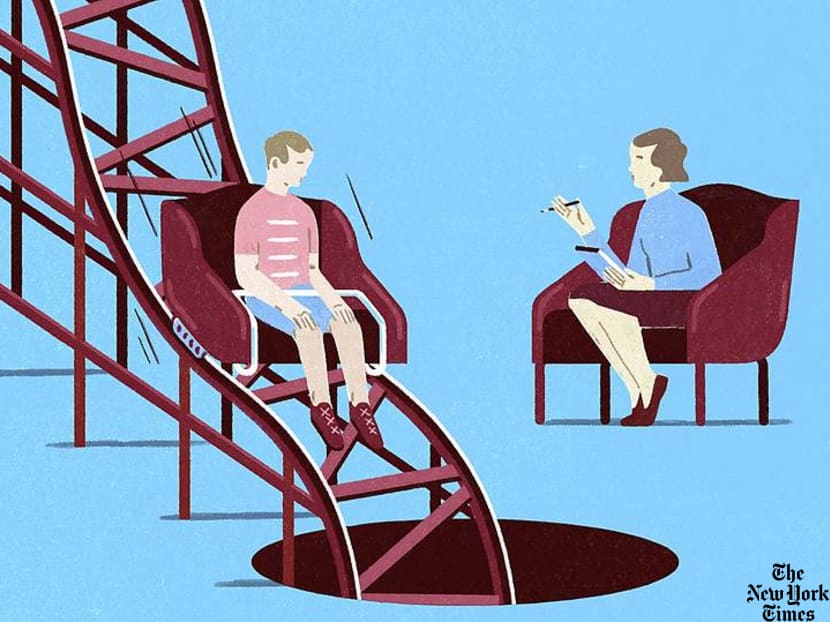
Symptoms of bipolar disorder in children may initially exist mistaken for other weather, and young people may suffer serious distress for years. (Art: The New York Times/Gracia Lam)
I was doing research and interviews on bipolar disorder when notices appeared in my Brooklyn neighborhood almost a 21-year-old man who had been missing for a week. He was described every bit "bipolar" and "may be experiencing a manic episode."
It took me dorsum nearly seven decades when the country police in Texas chosen my male parent to say they had found his brother, my favorite uncle, wandering on a highway. How he got there from Brooklyn we never learned. He had apparently suffered a psychotic break and concluded upwards in a New York Country mental hospital that administered electric shock treatments but did fiddling else to help him re-enter social club finer.
Not until decades after did he receive a correct diagnosis of manic depression, now known every bit bipolar disorder. Characterized by extreme shifts in mood, "manic-depressive illness" was officially recognised by the American Psychiatric Association in 1952. Merely it would be many years before an effective handling, the drug lithium, which acts on the brain to help stabilise debilitating episodes of astringent mania and depression, was available to help my brilliant uncle resume a reasonably normal life.
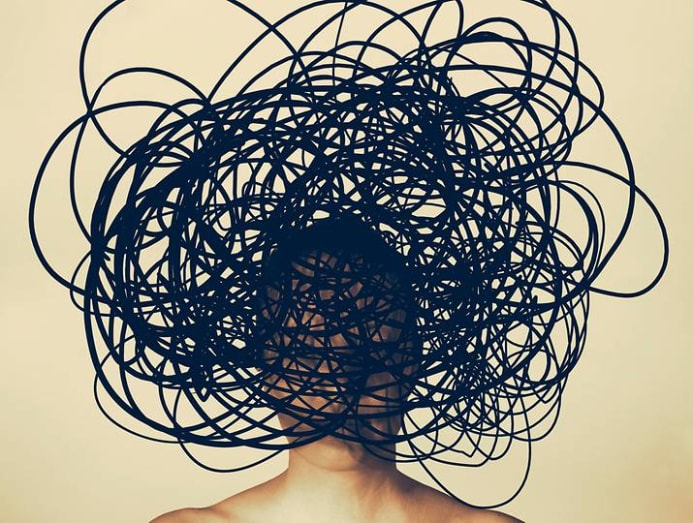
Bipolar disorder typically runs in families, with different members experiencing symptoms to a greater or lesser caste. If a parent has the disorder, a child'southward risk can rise to ten per cent. My uncle's only child displayed some pocket-sized behavioural characteristics of bipolar disorder, like very rapid speech and corybantic activity, but was able to complete two advanced degrees, marry, be a parent and succeed in an intellectually demanding career.
Bipolar disorder typically runs in families, with unlike members experiencing symptoms to a greater or lesser degree.
Bipolar disorder is virtually often diagnosed in the later teen years or young adulthood, affecting some 4 per cent of people at some point in their lives. But in recent decades, diagnosis of the disorder has soared in children and adolescents, although some experts believe the condition is over-diagnosed or over-treated with potent psychiatric drugs.
READ: The number of young children who demand mental health care is on the rise
Symptoms in children may initially be mistaken for other weather condition, such every bit ADHD (attention arrears/hyperactivity disorder) or oppositional defiant disorder, and immature people may suffer serious distress at home and in schoolhouse for years. As David Miklowitz, professor of psychiatry at UCLA School of Medicine, told me, there is nonetheless "an boilerplate lag of x years betwixt the onset of symptoms and getting proper treatment."
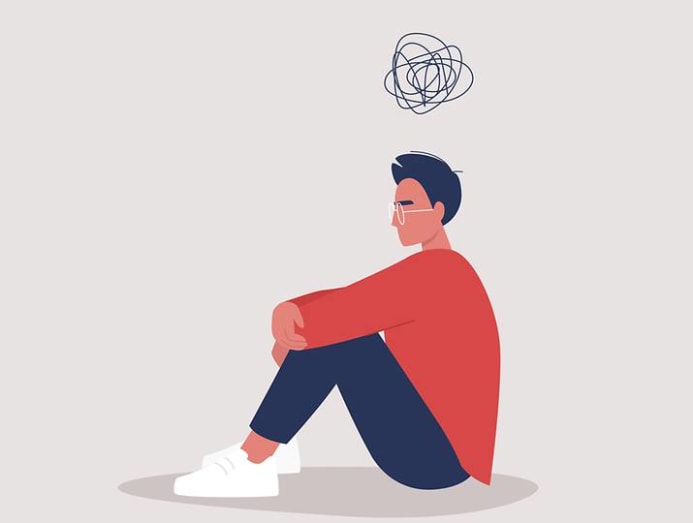
Based on studies of patients' histories, Dr Boris Birmaher, professor of psychiatry at the University of Pittsburgh School of Medicine, reported, "In up to 60 per cent of adults with bipolar disorder, onset of mood symptoms occurred before historic period 20. Nevertheless, pediatric bipolar disorder is often not recognised, and many youth with the disorder do not receive handling or are treated for comorbid weather rather than bipolar disorder."
The longer it takes to start advisable treatment, the worse the adult outcomes.
All the same, Dr Birmaher, who specialises in early-onset bipolar affliction, argues: "Paediatric bipolar disorder severely affects normal development and psychosocial functioning, and increases the risk for behavioural, academic, social and legal issues, as well as psychosis, substance corruption and suicide. The longer it takes to start appropriate treatment, the worse the adult outcomes."
With early detection, which is nigh likely to occur when there is a family history of bipolar disorder, some affected young people may respond well to family and behavioural therapy that obviates the need for medication, Dr Miklowitz suggested.
READ: Are y'all an early morning riser? You lot may be at a lower risk of depression compared to night owls
At that place is often resistance to treating children with drugs. Dr Terence A Ketter, retired professor of psychiatry at Stanford University, said one problem is that "faced with a bunch of badly behaved children, authorities want to give them antipsychotics to make them behave, simply if they're over-treated they can become like zombies." In agreement with Dr Miklowitz, he said, "On boilerplate it takes about a decade and iii different doctors to get children the right diagnosis and treatment."
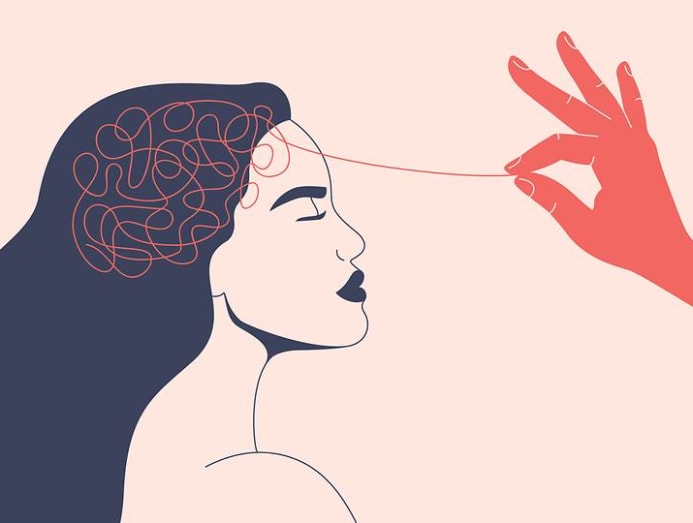
Another challenge to proper diagnosis and treatment stems from the boundless energy and extraordinary productivity and creativity that tin back-trail bouts of mania. Not until the mania reverts to astringent depression or, every bit happened to my uncle, psychosis, might a young person with bipolar disorder exist probable to receive needed medical attention.
Ronald Braunstein, conductor of the Me2 Orchestra he created with Caroline Whiddon to support talented people with mental illness, recalled that he was riding a manic moving ridge of artistic accomplishment in his early 20s when a crippling depression acquired a professional and personal crash. Yet for decades he was not treated properly and experienced repeated cycles of great successes every bit a usher followed by major failures.
I asked Braunstein, at present 65 and for the last 14 years finally being treated effectively for bipolar disorder, what he recalled about early signs of his mental illness.
READ: The flim-flam to raising kids to love exercise? Do it every bit a family
"Everything seemed off in my early teens – I didn't experience emotionally counterbalanced," he said. "Things were weirder than they should have been as a teenager. My father once took me to a psychiatrist who diagnosed me every bit having 'bad nerves.'"
As he described i early symptom of mania, "I wanted to learn how to fly, and I thought if I ran down a colina fast enough and tilted my easily in a certain angle I would take flown. In high schoolhouse I told fellow students I knew how to fly and I went to the top of a building to demonstrate. Fortunately, they talked me down."
He said, "I didn't know what was incorrect or that it could be treated." He added that for parents of teenagers, who may take difficulty recognising abnormal behaviour in adolescents, "it's sometimes hard to distinguish what is affliction and what is normal grandiosity or normal sadness that might have been acquired by a breakup with a girlfriend."
Dr Birmaher noted that young people with bipolar disorder usually have recurring episodes of major low, merely that "depressive episodes are not necessary for making the diagnosis." For some, mania is the primary symptom.
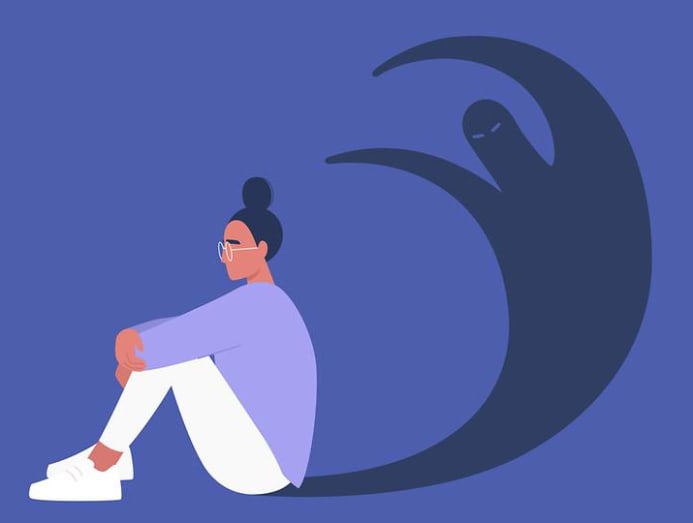
READ: Are you enlightened of air pollution's invisible cost on your health?
When depression is the symptom that brings patients to professional person attending, the correct diagnosis can be peculiarly tricky. Equally Dr Ketter explained, depressed individuals may exist unable to recall previous episodes of mania that occurred when they were not depressed.
Dr Miklowitz said one of the beginning signs of bipolar disorder is "mood dysregulation – the child is aroused or depressed one moment, then is excited and happy and total of ideas moments later."
He listed characteristics of mania that can assistance parents distinguish them from normal teenage highs and lows. The symptoms, several of which should be noticeable to other people, tin include "grandiose thinking, decreased need for sleep, rapid or pressured spoken communication and/or flight of ideas, racing thoughts, distractibility, excessive goal-driven activity, and impulsive or reckless behavior," Dr Miklowitz said.
With depressive symptoms, he suggests looking for "an impairment in performance – suddenly not going to school or going late, not finishing homework, sleeping through classes, a drop in grades, not wanting to eat with anyone else, talking about suicide, self-cutting."
Depending on the severity of a child'southward damage, if not-life-threatening symptoms are caught in the early teens, Dr Miklowitz said information technology may be possible to start with psychotherapy and avoid medication, which has side effects. "Simply if the kid's life is at risk, if he can't function at abode or at school, medication may be the respond," he said. "There are risks to not medicating."
When medication is necessary, he said, the dosage should be just high enough to control symptoms and non exist overly sedating.
By Jane Brody © The New York Times
This article originally appeared in The New York Times. https://www.nytimes.com/2021/07/05/well/mind/bipolar-disorder-immature-people.html

0 Response to "The challenges of treating bipolar disorder in young people"
Postar um comentário